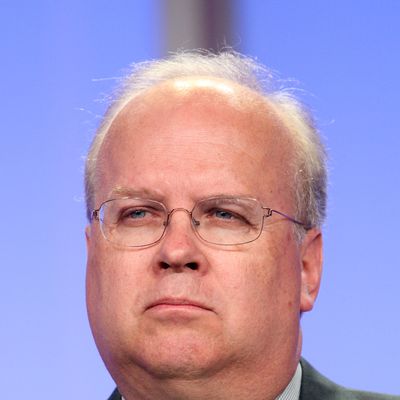
A party facing political hardship responds much the way people do when they face financial hardship. They look to jettison the things they care about the least, and hold on to what matters to them most. The post-election debate within the Republican party is occurring along two dimensions. One debate centers on whether the party needs to change much at all, and the other on what pieces of the party platform to chuck overboard and which to cling to.
The Republicans’ defeat came as such a shock to the party that all sides feel compelled to at least position themselves as advocates of change, though not all of them support any meaningful change, of course. Figures like Marco Rubio and Bobby Jindal are arguing more or less that the party should be more appealing and friendlier but not essentially different. Karl Rove, in an op-ed column today, insists, “Everything from the ground game to the date of the next convention needs to be re-examined.” Wow, that’s quite a range of self-examination. You’re willing to overhaul the date of the next convention? I guess changing the type size on the lawn signs would be taking things way too far.
Ramesh Ponnuru has an insightful essay in National Review arguing that the GOP lost because it was unable to craft workable solutions to problems like health care, wage stagnation, and systemic financial risk. Bloomberg View’s Josh Barro, a former contributor to National Review, takes his point and archly replies, “Any conceivable agenda that is likely to be effective in getting health care, jobs and higher wages in the hands of the American masses will be unconservative, at least on the terms by which most American conservatives define conservatism.”
Here we arrive at the real nub of the dilemma. The Republican Party has been organized around defending the material interests of the very rich — largely by defending low top tax rates as its maximal policy goal, but also secondarily through policies like lax regulation of the financial sector and opposition to social spending that would put upward pressure on the tax burden. The oddest thing about the party is that this agenda has been crafted by a fairly tiny number of people. Supply-siders, business lobbyists, Ayn Rand enthusiasts, and other advocates of a policy agenda centered around maximizing the after-tax income of the rich comprise a tiny share of the Republican Party.
What the 2012 election exposed more than anything else is that the party’s economic agenda is a gigantic political millstone. President Obama campaigned vociferously against the GOP’s advocacy of low taxes on the rich, and used it to discredit the entire party agenda. His populist economic themes fused perfectly with the image of Romney that was imprinted both by the ads attacking his record at Bain Capital and his own leaked remarks denouncing half of America as worthless moochers.
It’s not impossible for Republicans to win despite their advocacy of a plutocratic agenda. But other elements of the party coalition are beginning to wonder why they need to drag that millstone around in perpetuity. The factions within the GOP that have succeeded to maintaining control of the Republican Party have always managed to deflect such uncomfortable questions.
The imminent expiration of the Bush tax cuts, though, is creating an opening for some Republicans to question the party’s priorities. If Obama is going to veto any extension of the Bush tax cuts for the rich, Republicans can’t stop taxes on the high end from rising, so continued fealty to Norquistian absolutism becomes a completely futile gesture. Insisting on maintaining low taxes for the rich may not even be a successful strategy if all you care about is maintaining low taxes on the rich. The confluence of Obama’s reelection, the shock of the win born by Republican self-delusion, and the bargaining leverage Obama has compiled are all working together to force an opening for a reformation of the Republican Party of the sort that hasn’t been possible for more than two decades.






























